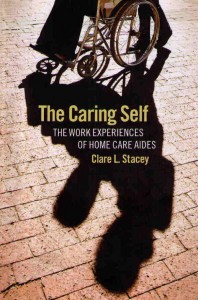Every owner, CEO, and administrator of a private duty home care business should read the book, The Caring Self: The Work Experiences of Home Care Aides, by Clare L. Stacey. An assistant professor of Sociology at Kent State University, Ms. Stacy interviewed 33 home care aides in California and Ohio in order to understand their life and working conditions.
One of the major insights coming out of her work is the concept of “emotional capital” and how it affects caregivers on the job. Emotional capital is a resource that is developed through “affective ties to children, spouses, and extended families that nurtures and sustains family bonds.” This emotional capital is a valuable resource for paid caregivers.
Here some other insights relative to home care aides:
- Workers who face intense emotional demands in the workplace, especially nursing homes, are more likely to leave the job, become depressed, or experience burn out.
- Emotional ties to clients can be a source of job satisfaction, as well as a source of strain.
- Some caregivers get meaning from the interpersonal pressures at work
- Women clearly amass emotional capital at rates greater than men
- Emotions are important resources that enable workers to manage human interaction on the job
- Years of providing family care prepares them for a career as a paid caregiver.
- Emotional capital accrues in the lives of home care aides as they move from unpaid to paid caregiving.
- Aides view their emotional commitments to their clients in a overwhelmingly positive light
- This emotional skill set affords aides a certain degree of expertise and competency on the job
- Aides see the skills associated with caregiving as being largely emotional and relational rather than physical or technical.
The interviews of these home caregivers revealed some other very interesting perspectives that home care company owners should consider:
- Feeling like part of the family of the client helps reinforce job satisfaction and identity formation on the job.
- Aides expend emotional labor helping clients manage their families, especially in those circumstances when family members are absent.
- Aides often witness unhealthy family dynamics first hand
- Sometimes, dealing with families is worse than dealing with the client.
- Aides view themselves as offering comprehensive care that includes both physical and emotional components.
- Aides resent clients who are mobile, active and socially engaged and treat home care as a house cleaning service
- Doing more cleaning than caring leads some aides to feel aliated from their professional work or “calling.”
Inspite of all of these emotional issues connected to the job of being a home caregiver, aides get great satisfaction from their work:
- “Even in the context of low occupational prestige and poor wages, home care aides assign meaning to their physical and emotional labor so as to remind themselves and others of the social value of their work.”
Aides in this study construct meaning at work in three primary ways:
- by describing their care as a natural ability or gift
- by framing their care as a service to others
- by drawing clear social boundaries between themselves and “uncaring others”.
This book is a quick read, and you’ll get some insights that will help you better understand the emotional capital needed to do this job well. We’re looking at this in the context of selecting candidates for the caregiver role, and how we can incorporate emotions into the caregiver selection process that is part of Caregiver Quality Assurance.
Let us know what you think after reading this book.




